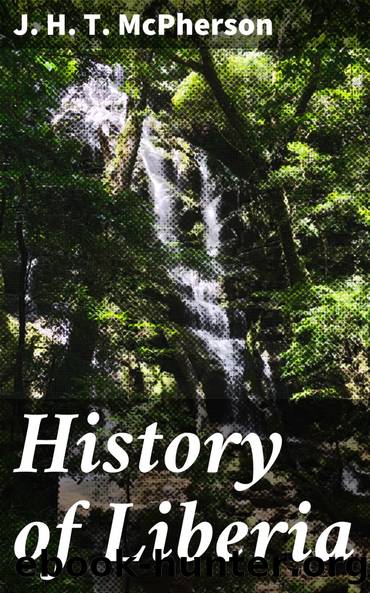History of Liberia by J. H. T. (John Hanson Thomas) McPherson

Author:J. H. T. (John Hanson Thomas) McPherson [McPherson, J. H. T.]
Language: eng
Format: epub
ISBN: 9781986054843
Google: fiOJAQAACAAJ
Publisher: CreateSpace Independent Publishing Platform
Published: 2018-02-28T03:53:28+00:00
V.
THE REPUBLIC OF LIBERIA.
The History of Liberia from this point on assumes a peculiar interest. The capacity and capabilities of the Negro are subjected to a crucial test. He is left fully freed from the control or influence of an alien race, in possession of a borrowed civilization, and of a borrowed political system of an advanced type, dependent on popular intelligence for its very existence. Can he maintain his position? Will he make further progress, developing along lines peculiar to his race and environment, and spreading a new civilization among the adjacent tribes? Or is he to lapse helplessly back into his original conditionâto be absorbed into the dense masses of surrounding barbarism? The question is a vital one. The solution of weighty problems in large part depends upon the answer.
The form of government was, as has been seen, closely copied from that of the United States. There is the same tripartite divisionâexecutive, legislative and judicial. The President is elected every two years, on the first Tuesday in May. He is commander-in-chief of the army and navy; makes treaties with the concurrence of two-thirds of the Senate, with whose advice he also appoints all public officers not otherwise provided for by law.
The legislative authority consists of a Senate of two members from each county, elected for four years, and a House of Representatives holding office for two years; four members being apportioned to Montserado county, three to Bassa, one to each other county, with one additional representative for each 10,000 inhabitants. The judicial power was vested in a Supreme Court with original jurisdiction in all cases affecting ambassadors and consuls and where the Republic is a party, and appellate jurisdiction in all other cases; and in subordinate courts to be established by the Legislature.
The majority of the colonists had been long accustomed to similar institutions in the land of their captivity, and the new machinery of government was soon running smoothly. Within the little State peace and prosperity prevailed; its foreign relations, on the contrary, were involved in the greatest uncertainty. It had indeed severed the leading strings which bound it to its natural protector, and stood forth in the assertion of its independence. But it was wholly unsupported and unrecognized. The dispute with England, whose protegé on the north looked with jealousy and distrust on Liberian policy, remained unsettled. The danger was real and pressing. Clearly recognition must be sought and an international footing obtained without delay. President Roberts accordingly determined to go abroad, and as at once chief magistrate and ambassador appeal to the leading courts of Europe. His first effort, however, was directed toward obtaining alliance with the United States. In America his reception was enthusiastic. But the delicacy with which the dissension on the slavery question made it necessary to handle every subject remotely bearing on that bone of contention, prevented him from obtaining even the formal recognition of Liberia. Roberts then determined by pleading his country's cause in England to arouse compassion in the heart of the power from which there was most to fear.
Download
This site does not store any files on its server. We only index and link to content provided by other sites. Please contact the content providers to delete copyright contents if any and email us, we'll remove relevant links or contents immediately.
| Central Africa | East Africa |
| North Africa | Southern Africa |
| West Africa | Algeria |
| Egypt | Ethiopia |
| Kenya | Nigeria |
| South Africa | Sudan |
| Zimbabwe |
Goodbye Paradise(2966)
Men at Arms by Terry Pratchett(2406)
Tobruk by Peter Fitzsimons(2062)
Pirate Alley by Terry McKnight(1909)
Arabs by Eugene Rogan(1836)
Borders by unknow(1787)
Belonging by Unknown(1467)
The Biafra Story by Frederick Forsyth(1323)
It's Our Turn to Eat by Michela Wrong(1303)
Botswana--Culture Smart! by Michael Main(1238)
A Winter in Arabia by Freya Stark(1225)
Gandhi by Ramachandra Guha(1196)
Coffee: From Bean to Barista by Robert W. Thurston(1181)
Livingstone by Tim Jeal(1152)
The Falls by Unknown(1142)
The Source by James A. Michener(1135)
The Shield and The Sword by Ernle Bradford(1101)
Egyptian Mythology A Fascinating Guide to Understanding the Gods, Goddesses, Monsters, and Mortals (Greek Mythology - Norse Mythology - Egyptian Mythology) by Matt Clayton(1088)
Africa: Altered States, Ordinary Miracles by Richard Dowden(1078)
